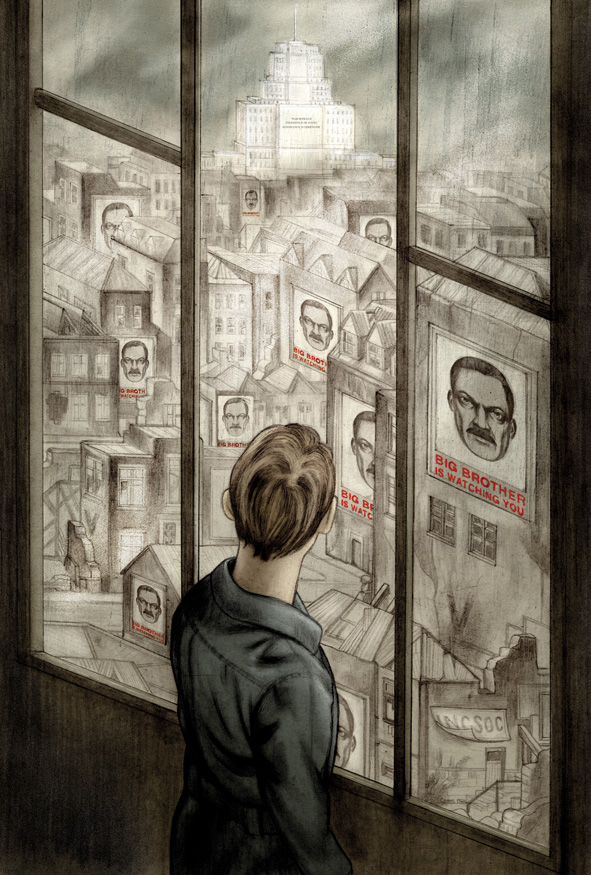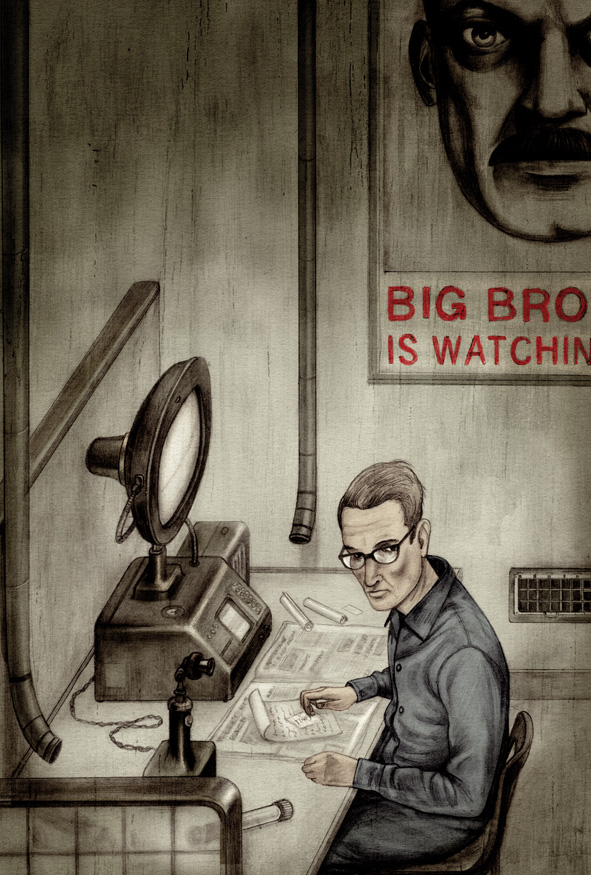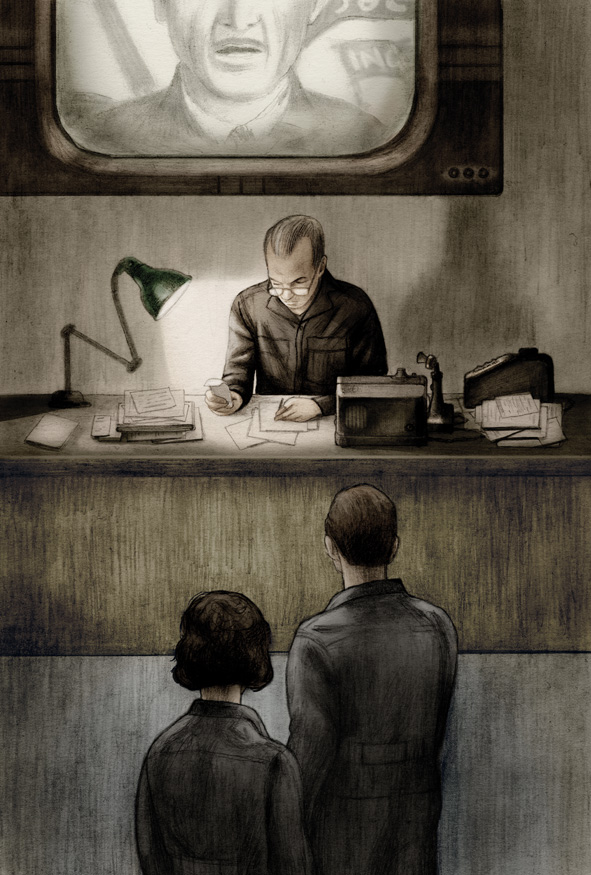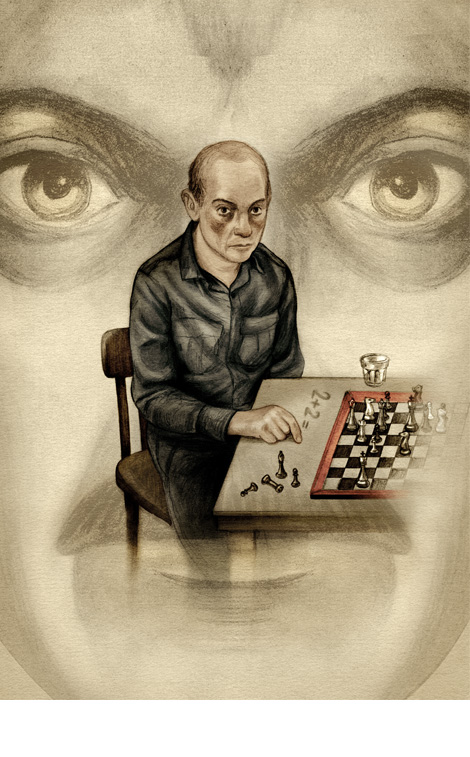Summary of Nineteen Eighty-Four by Anthony Burgess
A Clockwork Orange author, Anthony Burgess, summarises the novel, Nineteen Eighty-Four.
This is one of the few dystopian or cacotopian visions which have changed our habits of thought. It is possible to say that the ghastly future Orwell foretold has not come about simply because he foretold it: we were warned in time. On the other hand, it is possible to think of this novel as less a prophecy than the comic joining together of two disparate things — an image of England as it was in the immediate post-war era, a land of gloom and shortages, and the bizarrely impossible notion of British intellectuals taking over the government of the country (and, for that matter, the whole of the English-speaking world).
Nineteen Eighty-Four illustrated by Jonathan Burton

'There seemed to be no colour in anything, except the posters that were plastered everywhere.'

'On it was written, in a large unformed handwriting: I love you.'

'At the far end of the room, O'Brien was sitting at a table under a green-shaded lamp.'

'Almost unconsciously he traced with his finger in the dust on the table.'
Source: Haunting illustrations for Orwell's Nineteen Eighty-Four.
Nineteen Eighty-Four - Read full text
Links
About Nineteen Eighty-Four - British Library
The masterpiece that killed George Orwell - In 1946 Observer editor David Astor lent George Orwell a remote Scottish farmhouse in which to write his new book, Nineteen Eighty-Four. It became one of the most significant novels of the 20th century. Here, Robert McCrum tells the compelling story of Orwell's torturous stay on the island where the author, close to death and beset by creative demons, was engaged in a feverish race to finish the book.
1984 thought crime? Does it matter that George Orwell pinched the plot? George Orwell's Nineteen Eighty-Four is a classic – but it owes its plot, characters and conclusion to Yevgeny Zamyatin's 1920s novel "We".
Freedom or oppression? The fear of dystopia. Mike Ashley considers how British, Russian and American writers created repressive imaginary worlds and totalitarian regimes in order to explore 20th-century political concerns.
Nineteen Eighty-Four and the politics of dystopia Roger Luckhurst describes the political environment in which George Orwell wrote and published Nineteen Eighty-Four, and analyses its different – and often opposing – interpretations.
George Orwell's letter from his former French teacher, Aldous Huxley, about Nineteen Eighty Four.

Read another version of this here.
'Most Orwellian winner yet': The Invention of Russia takes Orwell Prize.
George Orwell's notebook in which he lists ideas for what would become Nineteen Eighty-Four, including 'newspeak', 'doublethink' and 'two minutes of hate'.
George Orwell's luminous truths, Jason Cowley at The Financial Times.
Orwell's review of Assignment in Utopia. Assignment in Utopia is widely recognised as one of the texts that served as inspiration for Orwell’s novel Nineteen Eighty-Four.
Orwell's political diary. Read diary here.
A collection of pamphlets, mainly political, formed by George Orwell.
Images from the Orwell diary entries
If it's "Orwellian", it's probably not.(The New York Times)
George Orwell's Nineteen Eighty-Four and Anna Funder's Stasiland / Blair Mahoney
 George Orwell's Nineteen Eighty-Four and Anna Funder's Stasiland by Call Number: 809.9 MAHISBN: 9781925316773
George Orwell's Nineteen Eighty-Four and Anna Funder's Stasiland by Call Number: 809.9 MAHISBN: 9781925316773
1984 BBC Radio Play from 1965
The BBC radio version of George Orwell's 1984 circa 1965 Starring Patrick Troughton as Winston Smith.
This radio drama, the “first audio production of the most challenging novel of 1949,” opens with a trigger warning, of sorts, that prepares us for a “disturbing broadcast.” To audiences just on the other side of the Nazi atrocities and the nuclear bombings of Japan, then dealing with the threat of Soviet Communism, Orwell’s dystopian fiction must have seemed dire and disturbing indeed.